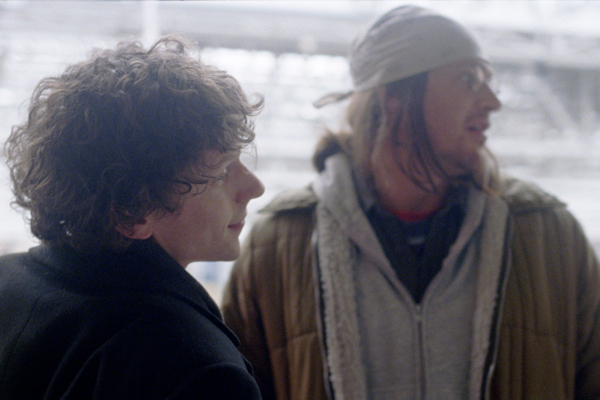Movie review by Greg Carlson
Filmmaker James Ponsoldt follows the success of “The Spectacular Now” with “The End of the Tour,” a fictionalized rendering of David Lipsky’s memoir “Although of Course You End Up Becoming Yourself,” an account of Lipsky’s experiences traveling with writer David Foster Wallace over five days while the latter was promoting “Infinite Jest.” The conversational transcripts of Lipsky’s interactions with Wallace offer a dangerously tempting format for translation into a workable screenplay, and scripter Donald Margulies successfully navigates the potential pitfalls. In the wrong hands, the endeavor could have proved disastrous, but the finished film is vibrant, magnetic, and alive.
If for no other reason, “The End of the Tour” merits attention for its thoughtful and humane peek behind a dark curtain. Wallace’s 2008 suicide casts a long shadow on every word spoken and gesture made by Jason Segel’s impressively performed version, and many viewers will be listening closely for portents and clues that could offer some insight into Wallace’s mind. Segel imagines a complex Wallace, and his outward largesse (masking hidden contempt for many of the rules of the game being played) contrasts with the aching jealousy Jesse Eisenberg brings to his portrayal of Lipsky.
“The End of the Tour” doesn’t exactly unfold with the fierce erudition of Wallace’s writing, relying in a few instances on easy stereotype. Joan Cusack, wonderful even when saddled with a broad Coen-esque caricature of Minnesota nice, transcends the borderline condescension meted out to her chipper Patty Gunderson – a Minneapolis guide who offers to show Lipsky and Wallace the statue of Mary Tyler Moore. In general, women are used in the movie to cook up a motif of sexual competition between Lipsky and Wallace, a dubious choice made in the service of doubling down on the movie’s exploration of male-male rivalry.
A few critics have wondered whether “The End of the Tour” would have been a better film had it been able to capture something of the essence of Wallace’s writing. Ponsoldt very clearly makes the decision to omit any scene that might have allowed for extensive quotation – and one answer for this likely resides in the emphatic objections of Wallace’s family and publisher Little, Brown to the film. In a statement that ran in the Los Angeles Times, the trustees wrote, “For the avoidance of doubt, there is no circumstance under which the David Foster Wallace Literary Trust would have consented to the adaptation of this interview into a motion picture, and we do not consider it an homage.” Ouch.
The irony is that “The End of the Tour” burnishes Wallace’s myth in what might be the highest profile hagiography since Lipsky’s book in 2010, and will surely help sell plenty of copies of Wallace’s work. The filmmakers clearly take great pains to admire Wallace as subject, bending over backwards to retain a sense of awe and worshipfulness that keeps a halo floating over the literary god’s bandana. Lipsky gets to be the jerk, seething at the realization that he will never achieve the acclaim and devotion earned by Wallace’s monumental talent.
